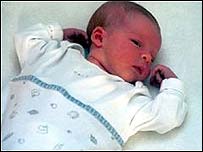|
Foetal flu link to schizophrenia
|
|||
The study found a dose of flu in the first half of pregnancy was linked to a three-fold increase in the risk of schizophrenia. However, illness in the second half of pregnancy seemed to have no effect. The research, led by New York's Columbia University, is published in Archives of General Psychiatry.
Their findings are based on an analysis of stored maternal blood samples from 64 patients with schizophrenia and 125 subjects without the disease. The samples were tested for antibodies to determine if flu exposure had occurred during pregnancy. The children who seemed to be most at risk were those whose mothers contracted flu in the first 13 weeks of pregnancy. For this group the risk increased seven-fold. Several previous studies suggested a relationship between flu during pregnancy and schizophrenia - but they relied on epidemics in populations, rather than a diagnosis of influenza in individual pregnant mothers. Researcher Dr Ezra Susser said: "These findings represent the strongest evidence thus far that prenatal exposure to influenza plays a role in schizophrenia. "The findings will need to be duplicated in other groups of people before we can draw firm conclusions from these results. "At this time, we advise against using these results for any public health policy or individual preventive actions. "However, if the results are confirmed in further studies, and the pathways are better understood, they could have very important implications for prevention." Exactly why exposure to the flu virus in the womb should increase the risk of schizophrenia is unknown. However, the researchers believe it could be a direct effect from the virus, or an indirect effect involving chemicals that are released in response to the virus. Paul Corry, of the mental health charity Rethink, welcomed the research, and said it was vital that more work was done into trying to understand the causes of the condition. |
|||
http://news.bbc.co.uk/2/hi/health/3527178.stm
